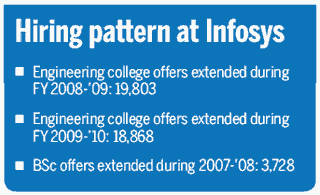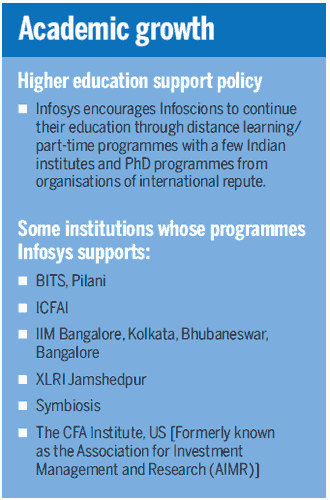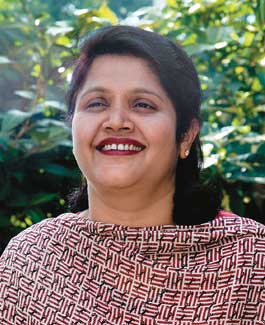
Nearly one million students try their luck with Infosys but only a fraction makes it. How to get the edge.
Company profile
Fortune magazine says that it is easier to get into Harvard than it is into Infosys. So what does it take to become a part of a US$ 4.8-billion company? In one word: consistency. There are two ways of getting a foothold in Infosys. One is the traditional way through campus hiring. The second is off campus recruitment which takes place on a need basis.
On-campus hiring
This an event in itself with the planning process starting a year in advance. Until 2008, Infosys trawled about 1,200 engineering colleges each year to pick the finest; however, after NASSCOM made it mandatory in 2009 that the recruitment process for on-campus hiring should only begin in the 8th semester, the entire hiring process shrunk to three months from the earlier 11 months. So now recruitment starts in November/December and continues till February.
Given the crunched timelines arising out of the rule, last year Infosys went to about 300 colleges for on-campus recruitment, selecting the best of the lot. Infosys' relationship with colleges does not end with placements; the company conducts round-the-year engagements with students and faculty members at the target colleges to help develop essential skills along the way.
The company conducts off campus selection from time to time depending on business needs. While campus hiring is focused on a particular set of colleges, the off campus hiring process enables students across the country to seek an opportunity with Infosys. This helps Infosys to spread the hiring net farther into small towns to take students from colleges that otherwise do not feature on the campus-visiting list.
Initiatives
Infosys partners with colleges, many of them in small towns and far-flung areas which may not be visited for campus placements, and implements specific development programmes such as Campus Connect to ensure sustained development of student quality over a period of time.

As part of its initiatives, Infosys invites college faculty to its campuses for an enablement programme. The usual duration is from four to 12 weeks. The training focuses on computer fundamentals, communication skills, teaching methodologies, behavioural and technical development.
The faculty members in turn train students on the subject and help develop key skills that are important for their employability with Infosys and any other company in the IT industry.
Engineers
Qualifications: Graduate/ Postgraduate engineers of all branches/ MCA
Academic score: Depending on the state and board the cut-off is set upwards of 65 per centin Class 10, 12 and graduation/postgraduation.
Students with backlogs are not allowed to go through the process.
Infosys representatives visit these 300-odd campuses to initiate the annual ritual of hiring able minds. Eligible students appear for the computer-based or paper-based test depending upon college infrastructure. The 1 hour 15 minute test is divided into two sections: Analytical Reasoning & Arithmetic Thinking and Verbal Ability. The first tests the candidate's learnability and problem-solving skills. The Verbal Ability test ascertains that the students have good communication skills, and have their fundamentals of English right.
Learnability is crucial as it demonstrates the potential employee's ability to keep pace with the fast-changing technologies in the dynamic IT industry. Recognising patterns, ability to gain conceptual understanding and decision making in uncertainty are some of the aspects assessed.
Shortlisted candidates then proceed for the interview. The interviews are behavioural in nature and try to assess students on aspects such as oral communication, problem-solving, analytical ability, soft skills, and conceptual knowledge. The interviews are rigorous but are not overly tough to crack.
"From time to time, we change the selection process in terms of the mode and/or the assessment methodology to ensure we do not become predictable," says Nandita Gurjar, Senior Vice President and Group Head, Human Resources, Infosys Technologies
If selected, an offer is extended to the candidates who then undergo up to six months of training at the Infosys Global Education Center in Mysore, upon joining. During the training period, candidates are paid a salary; currently the starting salary of a fresher is Rs 3.25 lakh per annum. Also, on joining the employee enters into a service agreement with the company which is effective from the date of joining to completion of one year from the date of allocation to a Practice Unit or project.
Infosys has a well-defined career path for employees with clear detailing of responsibilities. While all such hires join the organisation as software engineers, the system provides the flexibility for them to switch over to multiple career streams once they have attained the requisite experience, competency levels and proficiency.

Qualifications: BSc with 60-70 per cent (depending on state and board examination) in Class 10, 12 and graduation.
BSc graduates also go through the same process of entrance exam and interview, though the test papers are different and questions are pertinent to the potential role that they may play in the organisation. The entrance exam assesses the candidates' competencies in learnability, analytical ability and verbal ability. In some instances the candidates also go through an Ordinate test (voice, speech, articulation and modulation).
In a campus scenario, the tests are conducted at the college and since the tests are different, the engineering college students do not take the tests along with the BSc graduates. "We undertake a similar approach of on-campus and off-campus recruiting for BSc graduates," points out Gurjar.
Once they are selected after clearing the interviews, they typically undergo two months of training and after working in the company for 24 months if they wish to have a stronger grounding in computer sciences then they have the option of taking the six-month training that selected engineering graduates take right after joining. BSc graduates take up roles in Software Testing, Maintenance, Operations and Process.
Business graduates
For non-technical openings, Infosys goes to the top management institutes of the country to handpick students. These students do not have to appear for a test; the selection is based on their academic and interview performance and resume.
Management training
Selected management graduates step into managerial roles and are trained before entering into full-fledged role with Infosys. The training comprises a mix of behavioural as well as job-specific modules. While they go through an initial orientation for two days, the training is conducted by the specific business units that they work with and can last for up to a few months. Infosys lays a lot of importance on self learning and offers avenues for the employees to explore and learn.
Off campus or direct hiring
Engineering and BSc students whose colleges are not listed with Infosys can also apply. They need to register at Infosys' career website. Based on the resumes and only if Infosys hasn't yet filled up the number of openings, it considers such applicants. References from Infosys employees are also considered. Shortlisted candidates appear for the same entrance test and interview as engineers or BSc graduates do. However, Infosys did not conduct off campus recruitment for engineering graduates during the last two years owing to some business requirements.
Service agreement
If a candidate fails to clear the interview rounds then he or she can apply again only after a gap of nine months. And if the candidate leaves during the service agreement period then he or she may have to pay a fine of up to Rs 1 lakh. The company invests heavily in its people, and spends USD 5,000 per fresher for training.
But the attrition rate is low, 7-8 per cent, says Gurjar of Infosys Technologies. And the reason for it Gurjar points out is because in seven years' time the employees are already in mid-level management roles and therefore, fewer people tend to leave.

Nandita Gurjar, Senior Vice President and Group Head, Human Resources, Infosys Technologies .
More than a million apply and you only take one per cent from that pool...
We have to pick the finest in the country and so the examination has to be of a level that takes only the best. We are looking for is consistency. We are not looking for sharpshooters. For us those who have consistently performed through their lives, right from class 10 up until their college education are the people we want to invest in because these would be the people we could rely on.
Your interviews are as rigorous as the tests, why?
It is a very narrow funnel and there are quite a few parameters we judge candidates on. It is important to know whether these students know their stuff, know what they claim. Then, of course, we look for generic knowledge, that is their awareness on social and political issues outside the IT industry. Communications skills are important as our customer is a global customer.
So people with poor communication skills are often rejected in the interview. Another aspect that we consider very seriously is the student's value system and whether that matches with Infosys's. We value honesty, simplicity, integrity and confidence and expect the same from students Infosys recruits.